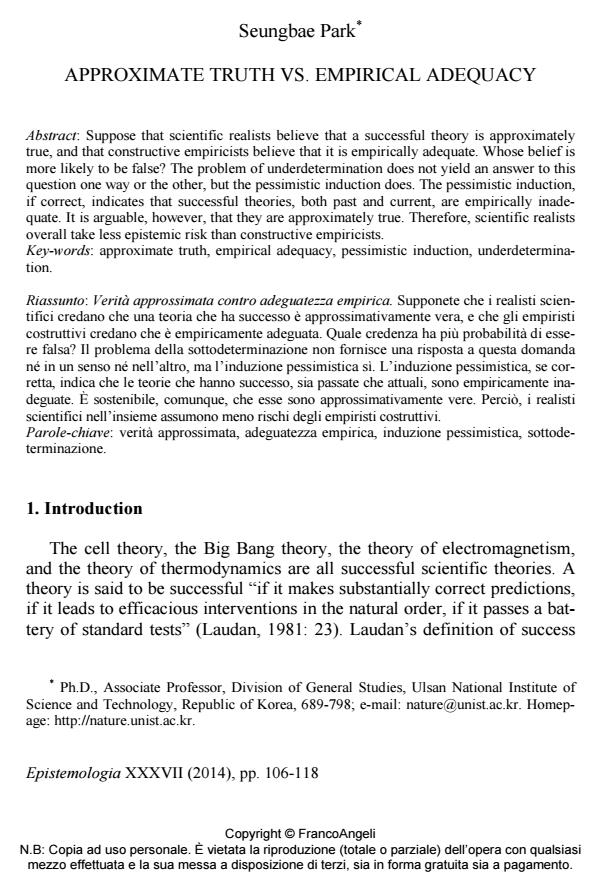Approximate truth vs. empirical adequacy
Titolo Rivista EPISTEMOLOGIA
Autori/Curatori Seungbae Park
Anno di pubblicazione 2014 Fascicolo 2014/1
Lingua Inglese Numero pagine 13 P. 106-118 Dimensione file 589 KB
DOI 10.3280/EPIS2014-001007
Il DOI è il codice a barre della proprietà intellettuale: per saperne di più
clicca qui
Qui sotto puoi vedere in anteprima la prima pagina di questo articolo.
Se questo articolo ti interessa, lo puoi acquistare (e scaricare in formato pdf) seguendo le facili indicazioni per acquistare il download credit. Acquista Download Credits per scaricare questo Articolo in formato PDF

FrancoAngeli è membro della Publishers International Linking Association, Inc (PILA)associazione indipendente e non profit per facilitare (attraverso i servizi tecnologici implementati da CrossRef.org) l’accesso degli studiosi ai contenuti digitali nelle pubblicazioni professionali e scientifiche
Suppose that scientific realists believe that a successful theory is approximately true, and that constructive empiricists believe that it is empirically adequate. Whose belief is more likely to be false? The problem of underdetermination does not yield an answer to this question one way or the other, but the pessimistic induction does. The pessimistic induction, if correct, indicates that successful theories, both past and current, are empirically inadequate. It is arguable, however, that they are approximately true. Therefore, scientific realists overall take less epistemic risk than constructive empiricists.
Verità approssimata contro adeguatezza empirica. Supponete che i realisti scientifici credano che una teoria che ha successo è approssimativamente vera, e che gli empiristi costruttivi credano che è empiricamente adeguata. Quale credenza ha più probabilità di essere falsa? Il problema della sottodeterminazione non fornisce una risposta a questa domanda né in un senso né nell’altro, ma l’induzione pessimistica sì. L’induzione pessimistica, se corretta, indica che le teorie che hanno successo, sia passate che attuali, sono empiricamente inadeguate. È sostenibile, comunque, che esse sono approssimativamente vere. Perciò, i realisti scientifici nell’insieme assumono meno rischi degli empiristi costruttivi.
Parole chiave:Verità approssimata, adeguatezza empirica, induzione pessimistica, sottodeterminazione.
- Kitcher P. (1993). The advancement of science. New York, Oxford University Press.
- Ladyman J., Douven I., Horsten L., van Fraassen B. (1997). A defense of van Fraassen’s critique of abductive inference: Reply to Psillos. The Philosophical Quarterly, 47, pp. 305-321.
- Lange M. (2002). Baseball, pessimistic inductions and the turnover fallacy, Analysis, 62(4), pp. 2881-2885.
- Laudan L. (1981). A confutation of convergent realism, Philosophy of Science, 48(1), pp. 19-49.
- Leplin J. (1997). A novel defense of scientific realism, New York, Oxford University Press.
- Mizrahi M. (2012). Why the ultimate argument for scientific realism ultimately fails, Studies in History and Philosophy of Science Part A, 43(1), pp. 132-138.
- Park S. (2001). Scientific realism vs. scientific antirealism, Ph.D. Dissertation, Tucson, Arizona University Press.
- Park S. (2009). Philosophical responses to underdetermination in science, Journal for General Philosophy of Science, 40(1), pp. 115-124.
- Park S. (2011). Coherence of our best scientific theory, Foundations of Science, 16(1), pp. 21-30.
- Park S. (2014). Accepting our best scientific theories, Pensée, 76(3), pp. 131-139.
- Poincaré H. (1905/1952). Science and hypothesis. New York, Dover.
- Psillos S. (1997). How not to defend constructive empiricism: A rejoinder. The Philosophical Quarterly 47, pp. 369-372.
- Psillos S. (1999). Scientific realism: How science tracks truth. New York, Routledge.
- Putnam H. (1975). Realism in mathematics and elsewhere. In Philosophical Papers vol. 1., Cambridge University Press.
- Stanford K. (2000). An antirealist explanation of the success of science, Philosophy of Science 67, pp. 266-284.
- van Fraassen B. (1980). The scientific image. Oxford, Oxford University Press.
- Embracing Scientific Realism Seungbae Park, pp.201 (ISBN:978-3-030-87812-2)
- Explanatory failures of relative realism Seungbae Park, in EPISTEMOLOGIA 1/2015 pp.18
DOI: 10.3280/EPIS2015-001002 - Realism Versus Surrealism Seungbae Park, in Foundations of Science /2016 pp.603
DOI: 10.1007/s10699-015-9427-x - Scientific Realism versus Antirealism in Science Education Seungbae Park, in Coactivity: Philosophy, Communication /2016 pp.72
DOI: 10.3846/cpc.2016.241 - Embracing Scientific Realism Seungbae Park, pp.45 (ISBN:978-3-030-87812-2)
Seungbae Park, Approximate truth vs. empirical adequacy in "EPISTEMOLOGIA" 1/2014, pp 106-118, DOI: 10.3280/EPIS2014-001007